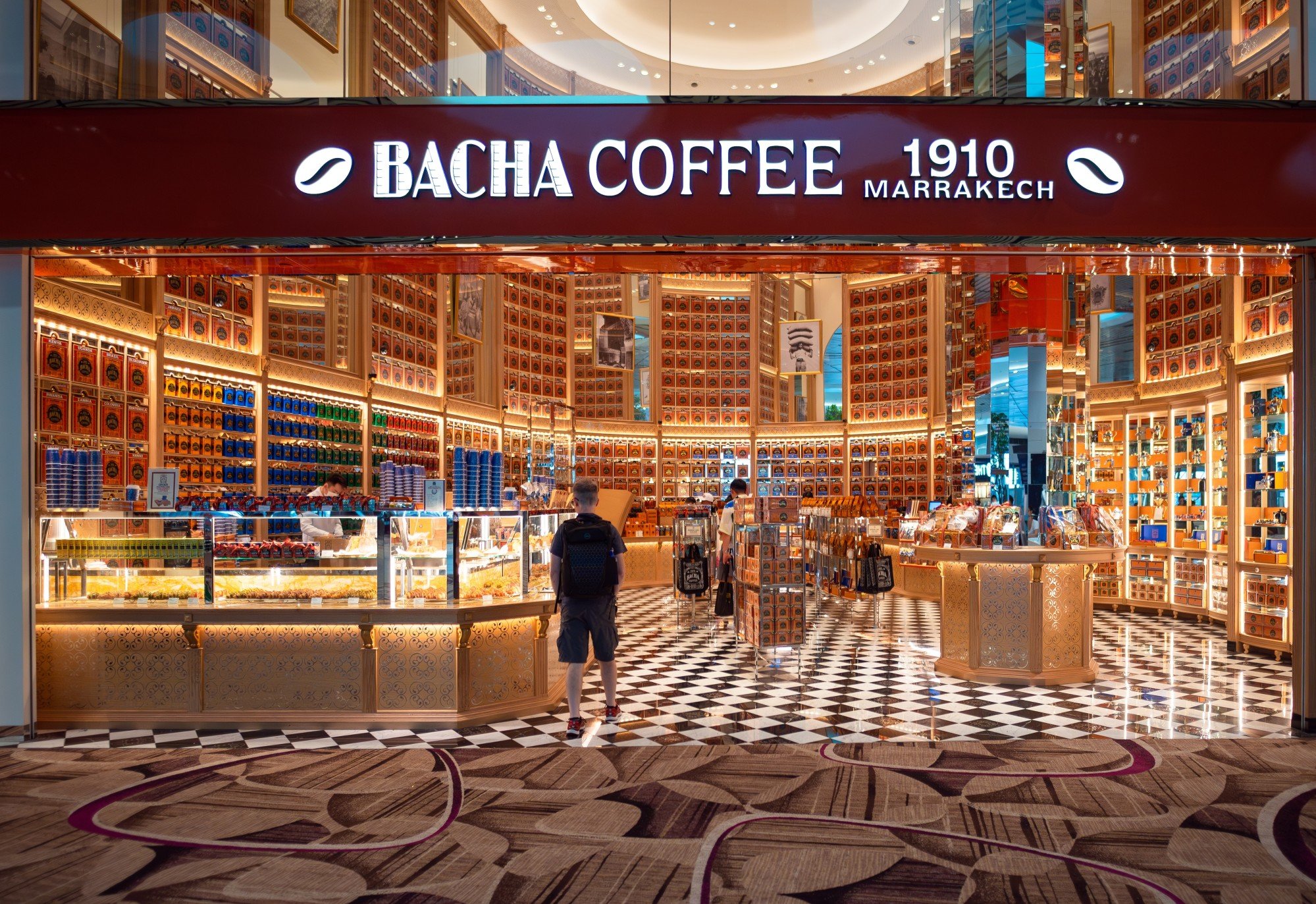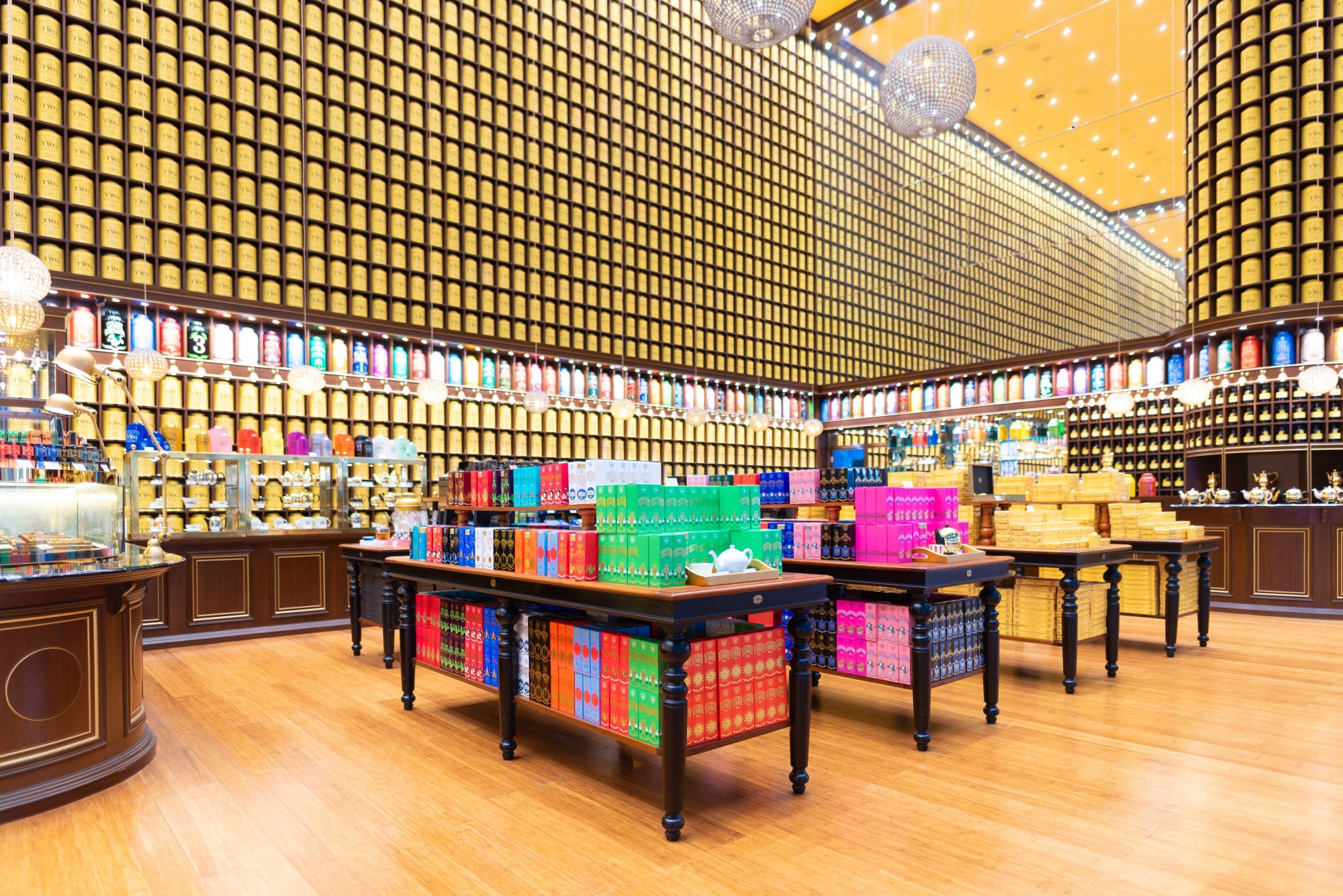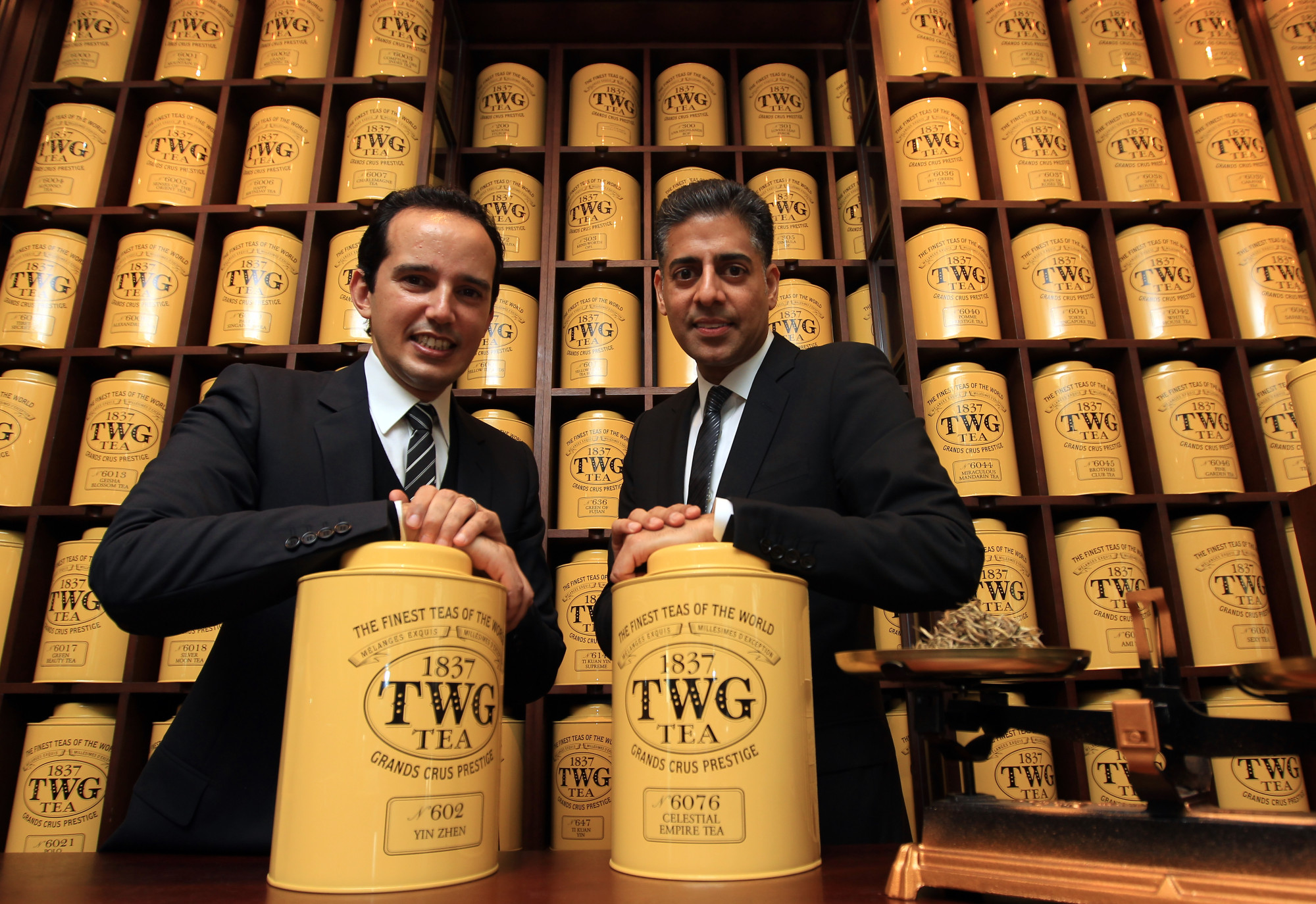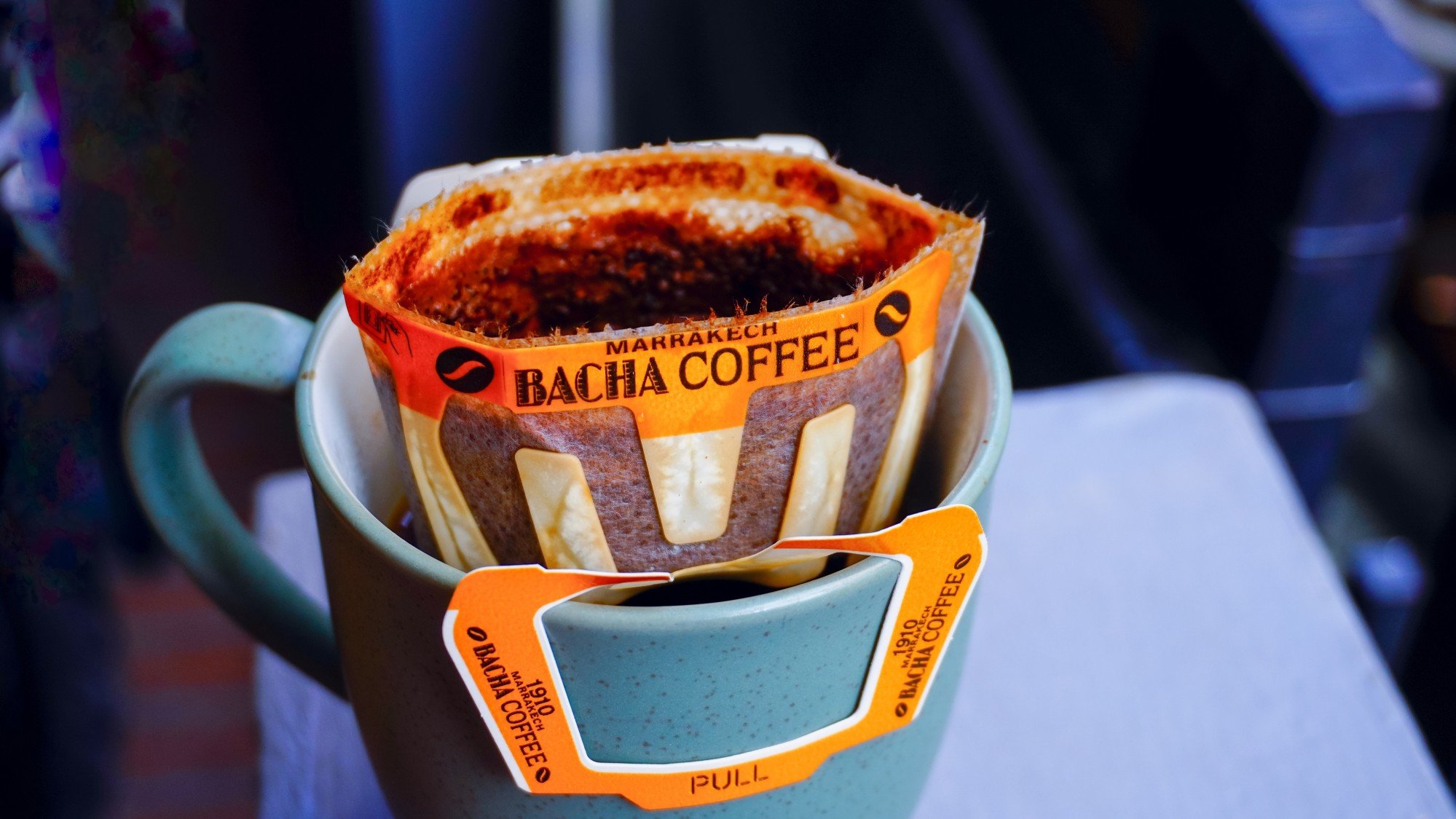They are also products that consumers, especially in Asia, are increasingly able and willing to pay a premium for.

Disposable income in the region is set to surge by about 60 per cent by 2040 – the fastest globally – and Singapore sits at the heart of tea and coffee supply chains.
Those market conditions, plus a lack of import duties for tea and coffee, made the city state an ideal home base for Bouqdib, who is French-Moroccan, and Barnes, an American.
Over the past 15 years, the married couple have expanded their retail outlets and cafes to more than 20 countries and territories with the backing of deep-pocketed business partners.
If you choose to build something that is kind of timeless, you cannot escape this element of grandiose
Bouqdib, Barnes and Singapore tycoon Ron Sim, founder of Osim massage chairs, announced in January 2022 that their holding company V3 Gourmet would spend US$100 million in investments on TWG, Bacha and other brands over three years.
The expansion included spending US$10 million-plus on a Bacha Coffee outlet in Singapore’s deserted Changi airport during the Covid-19 lockdown.
The bold bets are starting to pay off. TWG returned to profit in 2022, Bouqdib says, after losses of S$1.19 million (US$880,000) in 2021, according to a filing with Singapore’s accounting regulator.

Bacha Coffee turned a profit this year, Bouqdib says, without disclosing details. The coffee brand’s losses narrowed to S$3.4 million in 2022, according to its corporate filing.
But that’s not immediately apparent when walking into a store, and Bouqdib and Barnes like it that way.
Recipes to pair with a cup of tea, from morning until bedtime
Recipes to pair with a cup of tea, from morning until bedtime
In TWG, wall-to-wall tea canisters are stamped with the date 1837, a nod to when the Chamber of Commerce was established in Singapore. Bacha Coffee claims roots in Morocco’s Dar el Bacha palace, built in 1910.
The present-day Bacha is a relaunch of the coffee house that was located in the palace, according to a 2020 document from The National Foundation of Museums of the Kingdom of Morocco.
The shops’ eye-catching designs buttress these storied narratives. Stepping into the elegant, bright interiors of a Bacha store or the wood-panelled Victorian decor of a TWG cafe instantly transports customers into a world that feels somehow older – and wealthier.

That means customers in Singapore routinely wait in line to pay S$48 for an afternoon coffee set that includes a steak sandwich and a pastry, or as much as S$1,271.50 for a canister of loose tea to take home. The in-cafe selfie that gets posted to social media? Priceless.
“Based on their communications and positioning, I think many people would believe that TWG and Bacha Coffee were founded in 1837 and 1910,” says Mark Tanner, managing director at marketing agency China Skinny, which has helped Adidas, Nike and Ikea expand their presence in China.
“They are trading on the inherent trust that Asian consumers place with heritage.”
How Hong Kong-style milk tea in the UK is giving émigrés a taste of home
How Hong Kong-style milk tea in the UK is giving émigrés a taste of home
A look at media reports, social media and online forums show that many remain in the dark about the origins of TWG. New packaging will remove the 1837 year from its logo because “we don’t want to have kind of misled the communication”, Bouqdib says.
TWG began as the tea division of The Wellness Group, a company owned by Singapore-based entrepreneur Manoj Mohan Murjani, who met Bouqdib in 2003 or 2004 during his days with Mariage Frères in Paris, according to a 2019 Singapore High Court ruling stemming from litigation involving TWG and Murjani.
Bouqdib and Barnes moved to Singapore in 2007 to begin building TWG as the tea division of Murjani’s The Wellness Group.

Cracks in TWG’s leadership started to emerge in 2011. Sim, who took a stake in TWG Tea that year, called for a board meeting to consider removing Murjani as chief executive. Murjani resigned in September 2012 and several legal battles ensued.
Murjani is embroiled in a separate court fight with his current business partner, restaurateur Violet Oon, according to Singaporean newspaper the Straits Times. Murjani declined to comment but denied any wrongdoing during the trial in July.
Since Murjani’s exit, Bouqdib and Barnes have built on TWG’s relationship with Sim. The massage chair tycoon raised his stake to 70 per cent by 2014 and brought it under his V3 Group in 2021 as part of V3 Gourmet. As TWG expanded, competitors took note.
‘Aunties pushing carts full of delicious dim sum’: where to eat in Hong Kong
‘Aunties pushing carts full of delicious dim sum’: where to eat in Hong Kong
Between 2013 and 2017, TWG was embroiled in several trademark lawsuits with Bouqdib’s ex-employer, Mariage Frères, over the use of product names such as “Casablanca”, “Paris Breakfast Tea” and “Lucky Tea”, according to records from the UK’s Intellectual Property Office.
In 2011, Tsit Wing (Hong Kong), a wholesaler of coffee and tea since 1932 that goes by the name TWG, took TWG to court in a protracted battle over trademark infringement. TWG lost the case and rebranded its Hong Kong website and stores to “Tea WG”.
The year 1837 in TWG Tea’s logo “was plainly intended to convey a sense of long establishment” and led people to believe so, the judge said in the 2013 ruling. Bouqdib and Barnes say the legal wrangling is par for the course.
Milk tea: from a colonial concoction to an Asian solidarity movement
Milk tea: from a colonial concoction to an Asian solidarity movement
“It is inevitable that in the course of our expansion, as we grow, we will face legal challenges and battles. It is the part and parcel of building a global brand,” the couple said in response to follow-up queries.
While they are backing away from TWG’s 1837 labelling, they are all in on Bacha Coffee’s 1910 branding.
It represents the year that the Dar el Bacha palace was built as the residence of Thami El Glaoui, then pasha of Marrakech.

The palace “united the greatest cultural and political minds of the century over glittering pots of ‘coffee of Arabia’ or Arabica, as it is known today”, but then was closed for more than 60 years, according to Bacha Coffee’s website.
Bouqdib says he flew in architects from Singapore to renovate a part of the palace, now a museum, to open Bacha Coffee there.
“Tea and coffee, it’s not a new element today in the market,” he says. “If you choose to build something that is kind of timeless, you cannot escape this element of grandiose.”
When Bouqdib and Barnes set out to launch Bacha, they wanted customers to get a distinct experience from each of the brands.
TWG and Bacha offices are on two different floors at their King’s Centre headquarters in Singapore and they have separate warehouses and staff. Even the staff training sessions have different vibes, with TWG’s more quiet while Bacha’s is often loud and involves games.
“We feel that it’s best to have this mindset completely separated,” Bouqdib says. The staff for the two brands has grown to about 3,500, according to the couple.
The milk tea brand in London that’s giving Hongkongers a taste of home
The milk tea brand in London that’s giving Hongkongers a taste of home
Their focus now is to keep adding to the physical locations. TWG has more than 100 outlets and kiosks in malls, hotels and airports from Australia to Canada and Spain.
Bacha has most recently opened stores in Hong Kong, Qatar, Kuwait and Malaysia. V3 Gourmet is also considering options such as an initial public offering or partnerships for TWG and Bacha to boost business, Bouqdib says, adding that Sim is “quite happy with the globalisation”.
“We are building for the future,” Bouqdib says. “Building is first, the rest will come into your hands without any issue.”

